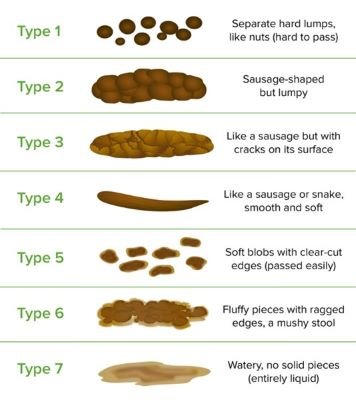How To Manage A Temperamental Gut (without changing your diet)
If you read past the title, it is likely because you experience either bloating, pain, excessive wind, diarrhoea, constipation or a mix of everything! All the confusion around your gut symptoms can cause anxiety around social settings (most of which are food-focused!), stress around needing to know where the nearest toilet is, and frustrations with the bathroom being your most used room in the house. If this sounds all too familiar, keep reading to gain some insight into regular bowel movements, strategies that might help with bloating, and what to do come the new year.
What is ‘normal’?
Before we dive into a few things we can do to manage symptoms, let’s first understand what is ‘normal’ stool. Most people should be opening their bowels (i.e. doing a poo) 1-2 times per day. This stool should look like types 3-4 on the Bristol Stool Chart (see photo).
Bristol Stool Chart
There shouldn’t be unexplained pain or excessive bloating or wind. Remember, some wind is COMPLETELY NORMAL. This is because we have billions upon billions of beneficial microbes living in our gut that ferment on undigested food (fibre) – farting can indicate you actually have a very healthy gut microbiome and fibre intake. But sometimes it might point to more IBS-like symptoms. This all depends on YOU – everyone is different and therefore there are different management strategies depending on what symptoms you have and how bad they are.
That said, there are a few things everyone can try out first to help with symptom management that don’t involve changing your diet.
3 easy strategies to reduce bloating:
Don’t drink through a straw
This is such a simple strategy to reduce bloating – this is because when you drink through a straw you also suck in some air with each sip. This can contribute to bloating simply by taking up space in your tummy.
Chew foods well
Aim for 25 chews per bite – this means your tummy has less work to do to break your food down into smaller pieces for nutrient absorption. It also means you will enjoy your meal more because you are more focused on it!
Try deep, abdominal breathing before eating
Eating doesn’t start with the mouth, but with the mind. There is a very strong connection between our brain and our gut via the vagus nerve. Utilise this connection by taking a moment to yourself before eating to practice abdominal breathing (expanding your abdomen, not your chest).
What to do now?
The gut is so incredibly complex, and while these strategies might help, they likely won’t completely manage your symptoms. Instead of spending 2024 Googling the thousand different ways to get your gut symptoms under control, join Ward Nutrition’s Gut Relief Program with Nadia, who is Monash University trained in the area of IBS and gut health. Nadia can provide personalised dietary advice, including meal plans, recipes and professional guidance to help you find relief.
Our Gut Relief Program comes in two stages:
Stage 1: Belly Balance Basics - initial + 3 reviews, focusing on understanding your symptoms, dietary and non-dietary triggers, and solutions forward
Stage 2: Rebuild Your Gut - 4 reviews, focusing on managing your symptoms long term with a new-found knowledge and understanding of your gut.
Book now or enquire to find your gut relief by emailing ward nutrition or phoning our admin team on 02 6362 9806 .



